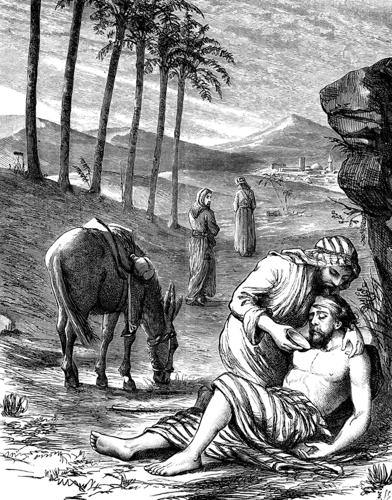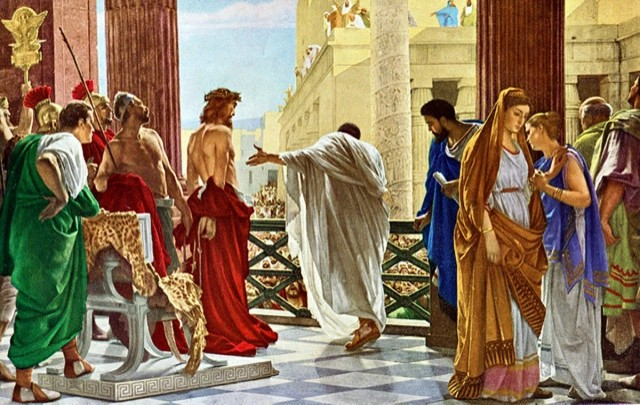𝗟𝘂𝗸𝗲 𝟭𝟮:𝟯𝟮-𝟯𝟰 “𝗙𝗲𝗮𝗿 𝗻𝗼𝘁, 𝗹𝗶𝘁𝘁𝗹𝗲 𝗳𝗹𝗼𝗰𝗸, 𝗳𝗼𝗿 𝗶𝘁 𝗶𝘀 𝘆𝗼𝘂𝗿 𝗙𝗮𝘁𝗵𝗲𝗿’𝘀 𝗴𝗼𝗼𝗱 𝗽𝗹𝗲𝗮𝘀𝘂𝗿𝗲 𝘁𝗼 𝗴𝗶𝘃𝗲 𝘆𝗼𝘂 𝘁𝗵𝗲 𝗸𝗶𝗻𝗴𝗱𝗼𝗺. 𝗦𝗲𝗹𝗹 𝘆𝗼𝘂𝗿 𝗽𝗼𝘀𝘀𝗲𝘀𝘀𝗶𝗼𝗻𝘀, 𝗮𝗻𝗱 𝗴𝗶𝘃𝗲 𝘁𝗼 𝘁𝗵𝗲 𝗻𝗲𝗲𝗱𝘆. 𝗣𝗿𝗼𝘃𝗶𝗱𝗲 𝘆𝗼𝘂𝗿𝘀𝗲𝗹𝘃𝗲𝘀 𝘄𝗶𝘁𝗵 𝗺𝗼𝗻𝗲𝘆𝗯𝗮𝗴𝘀 𝘁𝗵𝗮𝘁 𝗱𝗼 𝗻𝗼𝘁 𝗴𝗿𝗼𝘄 𝗼𝗹𝗱, 𝘄𝗶𝘁𝗵 𝗮 𝘁𝗿𝗲𝗮𝘀𝘂𝗿𝗲 𝗶𝗻 𝘁𝗵𝗲 𝗵𝗲𝗮𝘃𝗲𝗻𝘀 𝘁𝗵𝗮𝘁 𝗱𝗼𝗲𝘀 𝗻𝗼𝘁 𝗳𝗮𝗶𝗹, 𝘄𝗵𝗲𝗿𝗲 𝗻𝗼 𝘁𝗵𝗶𝗲𝗳 𝗮𝗽𝗽𝗿𝗼𝗮𝗰𝗵𝗲𝘀 𝗮𝗻𝗱 𝗻𝗼 𝗺𝗼𝘁𝗵 𝗱𝗲𝘀𝘁𝗿𝗼𝘆𝘀. 𝗙𝗼𝗿 𝘄𝗵𝗲𝗿𝗲 𝘆𝗼𝘂𝗿 𝘁𝗿𝗲𝗮𝘀𝘂𝗿𝗲 𝗶𝘀, 𝘁𝗵𝗲𝗿𝗲 𝘄𝗶𝗹𝗹 𝘆𝗼𝘂𝗿 𝗵𝗲𝗮𝗿𝘁 𝗯𝗲 𝗮𝗹𝘀𝗼.
After pointing out God’s glory in all creation – in birds, flowers and grass and saying how trite they were – even in their existence – to human beings, Jesus gave the “therefore” passage above. It’s both supremely endearing and challenging, even convicting.
The “little flock” is nonetheless the object of God’s pleasure and recipient of the very Kingdom of God. This flies in the face of any “big flock” mentality. Small is good in this passage, and of course Jesus was speaking to the small band of original believers. As the church grew, “little flock” would no longer describe it, except in comparison with the overall population.
A strong part of Jesus’ description of the creation was God’s care for it. It was and is God who waters the earth, sends sunlight to plants and provides food for all the animal kingdom. This is an indication of his care for people, whom God cares about more. There is hierarchy in the creation, and humankind is its apex.
The instruction to sell possessions and give to the needy implies that one has possessions and one is not needy. Far from any human socialistic system, this is generosity after God’s own heart.
And once exercised, there is a new treasure obtained. This is a restatement of the proverb:
𝗣𝗿𝗼𝘃𝗲𝗿𝗯𝘀 𝟭𝟵:𝟭𝟳 𝗛𝗲 𝘄𝗵𝗼 𝗶𝘀 𝗸𝗶𝗻𝗱 𝘁𝗼 𝘁𝗵𝗲 𝗽𝗼𝗼𝗿 𝗹𝗲𝗻𝗱𝘀 𝘁𝗼 𝘁𝗵𝗲 𝗟𝗢𝗥𝗗, 𝗮𝗻𝗱 𝗵𝗲 𝘄𝗶𝗹𝗹 𝗿𝗲𝘄𝗮𝗿𝗱 𝗵𝗶𝗺 𝗳𝗼𝗿 𝘄𝗵𝗮𝘁 𝗵𝗲 𝗵𝗮𝘀 𝗱𝗼𝗻𝗲.
… which is an almost scandalous truth concerning the heavenly economy. God becomes the debtor to human kindness and generosity. A reward is kept in eternity for the generous.
The final statement – “For where your treasure is, there will your heart be also” – shows that giving one’s possessions takes them off the throne of one’s life. You cannot worship something you give away and even renounce. Once done, the heart of a person – his/her intents and purposes – are directed and reside in heaven.

So, who is needy around me? Hands would go up if the question is asked. But clearly, there is godly counsel to be gained in this. Do I give grudgingly of any resource – finances, time, energy, etc. ? If so, that needs cleansing and correcting. I have freely received; get over yourself O my heart.
Do I demand notice and reward for my acts of kindness in this life? If so, Jesus says I have received my reward in full. That is NOT the treasure described in this passage. Give and I will prime the pump of blessing in my own life; that is very true. Let me be God’s conduit – his pipe – of blessing. Let it flow.








